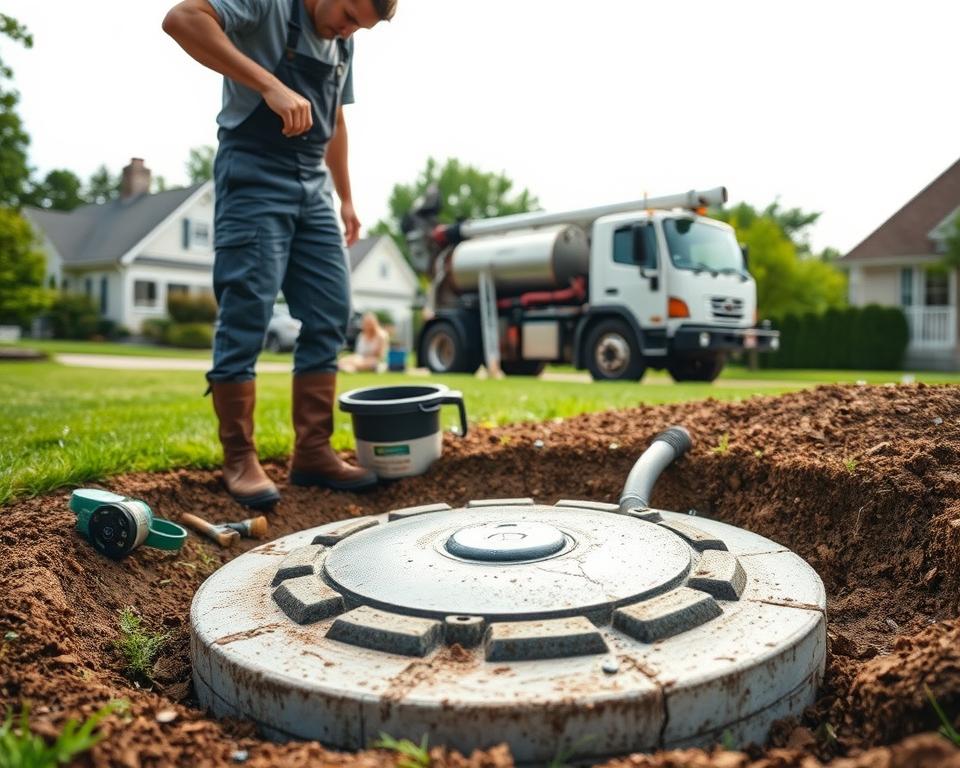Business Grease Trap Maintenance: Specialized Solutions
Have you ever pondered the influence of grease and food waste on your restaurant’s plumbing? This is a issue many overlook, yet the consequences can be severe. Making sure of consistent business oil separator maintenance is essential for a smooth-running kitchen and to avert pricey plumbing issues. Our solutions offer specialized grease interceptor pumping suited to your specific requirements.
At the core of these services is regular upkeep of dining establishment grease traps. This is critical for ensuring adherence and efficiency in your kitchen. With modern equipment and experienced technicians ready any time, we aim to help you in running your establishment operating smoothly. Let’s explore the importance of adequate grease trap management and the optimal practices for a sanitary, compliant kitchen.
Grasping Grease Traps and Their Value
Grease traps are vital for the smooth and clean running of industrial kitchens. Recognized also as grease interceptors, they handle the wastewater from eateries effectively. Their mechanism and significance are key to the longevity of food service businesses.
What is a Grease Trap?
A grease trap is a pipe system tool engineered to capture fats, oils, and grease (FOG) before they get into the sewage system. Its primary role is to avert these materials from clogging pipes, which can cause costly plumbing problems. Placed in the kitchen’s wastewater line, these septic tank cleaning companies use a baffle system to capture solid waste and grease.
As wastewater passes through, lighter materials like grease float to the top, while heavier solids sink at the bottom. This ensures efficient division, maintaining the system running smoothly.
How Grease Traps Work in Commercial Kitchens
The grease trap’s operation is reliant on division and containment. In hectic kitchens, during high-activity periods, upkeeping these traps is critical. Consistent pumping is needed to handle the buildup of grease and solids.
This pumping action eliminates the gathered waste, stopping clogs and maintaining hygienic states. Proper grease trap waste handling processes maintain the kitchen safe and adherent with health regulations. Kitchens that upkeep their grease traps effectively enhance operational efficiency and support societal safety regulations.
| Fat Catcher Operation | Importance in Commercial Kitchens |
|---|---|
| Divides FOG from wastewater | Averts plumbing blockages and pricey repairs |
| Facilitates consistent removal | Guarantees conformity with health regulations |
| Keeps kitchen area sanitary | Aids in food safety and sanitation |
Industrial Oil Separator Maintenance: Ideal Techniques
For any business culinary operation, servicing grease traps is essential. A consistent routine is essential to stopping blockages or overflows. Regular upkeep not only ensures the kitchen efficient but also defends against sanitation breaches.
Consistent Care Programs
Creating a maintenance schedule is vital for best grease trap performance. Usually, these traps should be serviced every one to three months, depending on the kitchen’s operation level and grease production. A minimized routine decreases the chance of grease gathering and associated problems.
Indicators of Urgent Grease Trap Issues
Noticing signs of grease trap spill can help avert bigger problems and expensive fixes. Typical signs include:
- Regular blockages in sinks and drains
- Foul smells coming from the trap
- Slow drainage of water
It’s essential to tackle these signs promptly. Ignoring them can lead to serious legal and financial repercussions from health inspectors. For proper grease removal in business culinary operations, contracting professional solutions assures compliance and ongoing activity.
Opting for the Best Provider for Dining Establishment Oil Separator Extraction
Choosing the ideal grease trap pumping provider is key to ensuring industrial food services functioning effectively. It’s essential to comprehend the factors at play to make informed decisions. This can significantly enhance your establishment’s hygiene levels.
Key Aspects for Selecting Oil Separator Solutions
Several key factors should affect your choice when hiring grease trap solutions:
-
Expertise: Select solution experts with a demonstrated success. Their expertise in grease control can be essential.
-
Accreditation: Verify the solution expert has the correct certifications and follows community waste management rules.
-
User Testimonials: Look at opinions from past clients to assess dependability and solution effectiveness.
-
Equipment and Techniques: Ensure the service company uses up-to-date techniques for grease extraction. Antiquated practices may not be proper.
-
Availability: Quick prompt availability is crucial to prevent expensive delays.
Benefits of Using Professional Grease Removal Services
Specialized fat catcher maintenance provide significant gains:
-
Efficient Oil Handling: Specialists assure waste is handled correctly, reducing ecological dangers.
-
Efficiency Boost: Delegating grease service releases kitchen staff to concentrate on food production.
-
Lawful Operation: Experts keep up with law modifications, assisting your establishment be lawful.
-
Sanitation and Security: Proper maintenance decreases health dangers and costly drain blockages.
-
Future Expense Reduction: Routine oil extraction can avert costly fixes or exchanges down the line.
Environmental Impact of Proper Grease Waste Disposal
Correct oil management is crucial for green safety. Efficient oil separator upkeep reduces contaminants in community water sources. This not only protects aquatic life but also improves the ecosystem’s hygiene. Companies must understand their part in waste control to comply with grease trap waste regulations, thus reducing the environmental impact of grease management.
Ways Correct Waste Management Benefits Ecology
Efficient grease waste disposal delivers numerous ecological advantages:
- It prevents grease from tainting water by excluding it from drainage systems.
- It helps the operation of water treatment facilities.
- It supports the health of regional fauna and ecosystems.
Rules on Fat Catcher Management
Adhering to grease trap waste laws is vital for culinary operations. These rules guarantee proper management of grease interceptor waste. Key guidelines include:
| Regulation | Explanation |
|---|---|
| Clean Water Act | A federal law that controls discharges of pollutants into the waters of the United States. |
| Regional Sanitation Rules | Specific rules established by local governments regarding the management and handling of grease waste. |
| Documentation Requirements | Accredited establishments must keep comprehensive records of waste disposal activities to promote transparency. |
By complying with these regulations, establishments ensure proper oil handling and reduce their environmental impact. Understanding the significance of correct oil management promotes a eco-friendly future for our communities.
Oil Separator Extraction and Its Role in Culinary Operations
In the fast-paced world of culinary operations, grease interceptor pumping services are vital for keeping efficiency and sanitation. These interceptors are crucial in preventing grease and oil from infiltrating the sewage system, which can cause blockages and result in significant penalties. Regular pumping guarantees these systems don’t spill, defending the kitchen from potential health hazards and maintaining food safety.
Ensuring culinary operations grease interceptors in top condition is essential to complying with health regulations and maintaining a sanitary environment. A properly serviced interceptor minimizes the risk of unpleasant smells and keeps the environment clean for staff and customers. By opting for professional grease interceptor pumping, food service businesses can concentrate on preparing delicious meals without concern over waste management.
Moreover, routine removal of grease interceptors is more than just consistent care; it’s an investment in the long-term success of food service establishments. Establishments that adhere to a regular extraction plan avoid the need for emergency cleanups and support environmental initiatives by assuring proper waste disposal. Highlighting the importance of this maintenance is crucial for establishing a safe and compliant food service environment.



